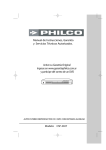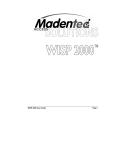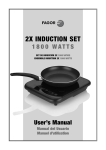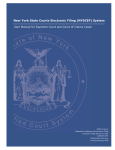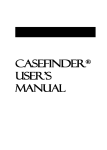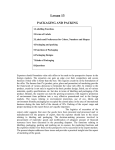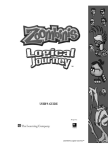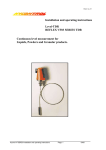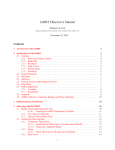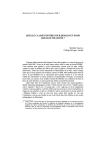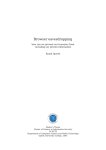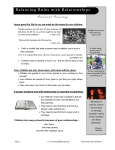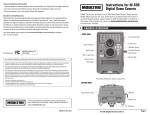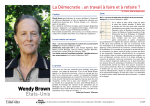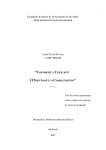Download ProCD v. Zeidenberg in Context
Transcript
+(,121/,1( Citation: 2004 Wis. L. Rev. 821 2004 Content downloaded/printed from HeinOnline (http://heinonline.org) Sun Sep 7 01:30:50 2014 -- Your use of this HeinOnline PDF indicates your acceptance of HeinOnline's Terms and Conditions of the license agreement available at http://heinonline.org/HOL/License -- The search text of this PDF is generated from uncorrected OCR text. -- To obtain permission to use this article beyond the scope of your HeinOnline license, please use: https://www.copyright.com/ccc/basicSearch.do? &operation=go&searchType=0 &lastSearch=simple&all=on&titleOrStdNo=0043-650X APPENDIX PROCD V. ZEIDENBERG IN CONTEXT INTRODUCTION The following is a transcript of a videotaped interview of Matthew Zeidenberg, defendant in ProCD, Inc. v. Zeidenberg, 86 F.3d 1447 (7th Cir. 1996), and David Austin, his attorney in that case. The interviewer is Bill Whitford, Emeritus Professor of Law at the University of Wisconsin Law School. The videotape was first shown on February 7, 2004, at the Freedom from Contract Symposium during which the papers included in this symposium issue were first presented. The videotape was made about two weeks before that. The videotape can be downloaded from the Law Review's website.' The transcript has been edited for style-primarily to eliminate references and usages appropriate to an oral presentation that are less appropriate for a written account of the interview. No substantive changes have been made. I. BACKGROUND [Bill Whitford:] My name is Bill Whitford. I have here Matt Zeidenberg and David Austin. They are the defendant and attorney, respectively, in the case of ProCD v. Zeidenberg, one of the most famous American contract cases in the past decade. I have prevailed upon Matt and David to relate some of the events connected with this case that don't appear in the opinions. Our purpose is to provide information to the law teaching profession, for whatever use they want to make of it in their writings and in their teaching. I will be interviewing Matt and David. I will start with Matt and go over some of the events that preceded the litigation. When I get to the litigation, I will introduce Dave and ask him about his recollections and reactions. Matt, can you give me a brief biography? How did you end up at Wisconsin and what are you doing now? [Matt:] Well, I came here for graduate school. I went to Harvard as an undergrad, studied physics, and then decided I wanted to go into Computer Science. Wisconsin has a good Computer Science program so I came here. 1. Wisconsin Law Review, ProCDv. Zeidenberg in Context, at http:llstudents.law.wisc.edu/lawreview/zeidenberg. WISCONSIN LAW REVIEW [Bill:] And I think you're also a graduate student in Sociology now? [Matt:] Yes, I was also interested in Sociology and Wisconsin has a very good graduate program in Sociology as well, so I have actually ended up studying both. [Bill:] And you're pursuing two PhD's? [Matt:] Actually I already have my Computer Science PhD, and I'm probably going to get my other one [Sociology] within this year or soon thereafter. [Bill:] How did you first come to be interested in and learn about the ProCD product? [Matt:] The ProCD product was called SelectPhone. I was doing some work for some political groups. We wanted to look up phone numbers for names on voter lists that we possessed. SelectPhone was one of the first products that allowed you to download the numbers of all the people in a particular zip code, and then you could match a voter list against the addresses and phone numbers, get the phone numbers and solicit those people. So I initially bought the product for that. One of the things that attracted me to SelectPhone was that they advertise that there are no limits on how many records you could download from the CD. [Bill:] I'd like to interrupt here a little bit for the sake of the viewers. I have here some Xeroxes provided to me by Matt of the actual box that he bought. I want to call attention to some print that is too fine to show on camera. In eight point type here [pointing] there is this language: "HomePhone offer"-HomePhone was the name of the product, or SelectPhone? [Matt:] I'm not sure. [Bill:] It says HomePhone. Anyhow, it offers "unlimited access and unlimited use of all 80 million listings, period. Other phone books limit you to a mere 5000 records." At the very bottom of the page, in smaller type, six or seven point type, is the following language, which is quoted in Judge Easterbrook's opinion: "All listings are subject to terms and conditions of the enclosed license agreement." Excuse me for the interruption, Matt. 2004:821 ProCD v. Zeidenberg in Context 823 [Matt:] So basically I was interested in the fact that there were competing products and they [ProCD] were pushing the idea that a buyer could do unlimited downloading. When you buy something like this product, what you want to use it for is to get listings out of it. So I bought the product in part because of that, and then when I popped open the user guide-and I'm actually still stunned to this day that this was in there-there's this letter from a gentleman that I later met, James Bryant, the President of the ProCD in which he said, "Well, the reason why we were able to start this company was because of the Feist decision." And I had no idea what the Feist decision was, so that piqued my curiosity. I went on the Web and I looked it up. Basically it ruled that a lot of factual information wasn't subject to copyright. I believe it was a unanimous Supreme Court decision. [Bill:] That's right. [Matt:] So this piqued my interest and I said, "Hmm, what's the deal here?" [Laughs] How can this guy think that he can go around and redistribute this information and yet use this contractual language to, you know-he was basically shrinkwrapping a copyright around these listings is the way I looked at it. [Bill:] Now the contractual language itself was also in this manual? [Matt:] Yeah, in the back. [Bill:] I have here a photocopy of the manual. It includes the letter [from President Bryant] that Matt referred to. The contractual language is on pages 72 and 73 of the manual. This is the only place in the manual where there's any reference to returning the product if the buyer is unsatisfied with anything in the user manual. It's on the top of page 72, in, I think, seven-point type. Matt, what was the state of the Web at the time? Was it easy to get telephone numbers and so forth on the Web? [Matt:] No. The Web was basically in its infancy. This was '95, and I think the Web had basically gotten popular in maybe '93 or something like that. It existed in essential form maybe around '91, but in '95 it was really just beginning to take off, and there was nobody offering this kind of information. I was obviously was just a grad student but I figured that if I jump in first, maybe I can get some advantage here. [Bill:] So were you hoping to make money on this venture? WISCONSIN LAW REVIEW [Matt:] Yeah. [Bill:] How were you going to make money? [Matt:] Banner advertising. [Bill:] Did you make any money? [Matt:] No. [Bill:] Why not? [Matt:] Well, I was just going to sell Yellow-Pages-type advertising. I got one guy to give me a check for a hundred bucks at one point, but I had to return it because the injunction had already been entered against me before I could get his advertisement up on the Web. [Bill:] So before you had any advertising up on the Web, you were enjoined? [Matt:] Right. [Bill:] That, incidentally, is a fact that is incorrectly stated in Judge Easterbrook's opinion. Did you seek any legal advice before you set up the Web site containing the information contained in the ProCD product? [Matt:] Yeah. The first thing I did was some legal research of my own. I'm not a lawyer but I poked around and I read Feist, and then I read various shrinkwrap cases like StepSaver and Arizona Retail Systems. Basically my impression was at that point that there hadn't been any shrinkwrap agreement that had been upheld by the courts. I think that my case might have been the first shrinkwrap agreement that was upheld by the courts. [Bill:] Did you consult any lawyers? [Matt:] Yeah. After I did my own legal research, I went to see Professor Kidwell here at the University of Wisconsin Law School2 and he basically said "Yeah, you're probably legally in the clear, but you'll definitely be sued." [Laughs] So he was right. 2. Note that Matt's memory was incorrect here; the conversation between him and Professor John Kidwell was over the phone, as Kidwell later pointed out. 2004:821 ProCD v. Zeidenberg in Context 825 [Bill:] And anybody else? [Matt:] Yeah, I talked to a friend of mine who is a lawyer in Arizona. I talked to a local corporate lawyer who actually helped me set up a company to try to shield me from some liability that might arise. [Bill:] When you set up the website, I understand you used this product, but also another product as well? [Matt:] Right. There was another company's product which I think was the only other one that allowed unlimited downloading. So I figured that I'll use both of them and that way I could get a defense against any originality claims they might have from the fact that what I had was exactly what they did. Because I was mixing [the two]. Also, I made what I consider to be a serious tactical error. What I should have done, if I wanted to avoid the litigation altogether, is to have taken the intersection of the two sets of listings. The companies put phony listings in their product, which they call "seeds," to allow them to detect anyone copying their listings. So if I'd done the intersection of the two sets, as opposed to the union of the two sets, I would have eliminated the seeds. A friend of mine at the time advised me to do that, but I got a little greedy. I had this sort of outlaw state of mind. It wasn't all about money. It was like, I'm going to do this, damn the torpedoes. [Laughs] [Bill:] Now when you set the site up, did it include listings for the whole country? You only had listings for part of the country on the Web first, right? [Matt:] Right. I had to sit there and wait for the thing to download the listings and it cost money. This was at a time when computers were not as fast and disk space was not as cheap. And so I put California and Wisconsin up on the Web initially. And I had plans to put the whole country up. [Bill:] And were you getting many hits? [Matt:] Yeah, I was getting like 20,000 hits a day. That was because I promoted it on bulletin boards and places like that, and I was getting word-of-mouth on the Web. [Bill:] How long was your site up before it was enjoined? [Matt:] I think something like May to September; it was enjoined in September I believe. WISCONSIN LAW REVIEW [Bill:] And the site never went back up again once it was enjoined? [Matt:] We're getting a little ahead of ourselves, but I got another provider when the injunction was lifted after Judge Crabb's decision granting us summary judgment. I got another provider and I was planning to put it back on line, but I don't think I actually did. [Bill:] How quickly did ProCD respond once you had established the website? [Matt:] Well, it's quite a long time ago now. I think I had established it around May, and then they got wind of it around July. Their attorneys wrote me-well, first they tried to call me on the phone but I kind of stonewalled that. Then their attorneys wrote me a letter, and then I wrote sort of a response. I look at the response now as sort of arrogant, [laughs] but it was a sort of crazy thing. Their attorneys were Hale and Dorr, who go back, I don't know, centuries or something. [Laughs] It's like if you saw the .... [Bill:] They came across on the Mayflower, right? [Matt:] Yeah. [Bill:] And they also represented, you told me, the defendants in [the book and movie] A Civil Action? [Matt:] Right. Robert Duvall was the lawyer in the movie. [Bill:] So did you fear that a lawsuit was coming, as a result of these phone calls and this letter you sent and stuff like that? [Matt:] Yeah. [Bill:] Did you have any legal representation at that time? [Matt:] No. [Laughs] That's how Dave [Austin] came into it. [Bill:] How did you get Dave? [Matt:] Well, Dave's wife Laura, who I actually still work with, she was coming to town to join our office where I work-and I still work there and so does Laura-and so I'd heard that Laura was married to a lawyer, or actually they'd just gotten married right at that time. And he had just graduated from law school, and so I thought maybe he'd be interested. So I got in touch with him. 2004:821 ProCD v. Zeidenberg in Context [Bill:] And just one final question before I turn to Dave. Was there any publicity? When the law suit was ultimately filed, was there any local publicity or anything arranged by ProCD in connection with the filing of the lawsuit? [Matt:] Yeah, well, I'm not exactly sure if this was before or after the filing of the lawsuit, but there was quite a bit of publicity. I was on two TV stations, I was in the both local newspapers, the campus papers, and the Milwaukee JournalSentinel. [Bill:] These are people who contacted you? [Matt:] Yeah. And then Bryant, who was the President of ProCD, went around giving interviews. He was calling me a criminal. He may have complained to the DA, trying to get me indicted. II. THE TRIAL [Bill:] I'm going to turn to Dave now. Dave, can you give us a brief biography-how did you end up in Madison, where do you come from, how much legal experience did you have when Matt retained you? What are you doing now? [Dave:] I grew up in Ann Arbor, Michigan. I did my undergraduate I went to Law School at work at the University of Michigan. Northeastern University in Boston. I graduated from Northeastern in May of 1995. And then, as Matt said, my wife Laura and I moved here that summer. I took the bar exam here in Wisconsin that July and then I was admitted to the bar in September of 1995. And one of the ironies of this case is that I was admitted to the bar on exactly the same day that the complaint was filed. I was sworn in at a noon ceremony in the capitol and then later that afternoon Matt contacted me and told me he had just been served with the complaint. So to your question of how much legal experience I had as an attorney-zero. I had, you know, whatever experience I had gotten as an intern in law school, but that was it. [Bill:] Well, Northeastern is well known for its many clinical internships. [Dave:] Right. [Bill:] And what motivated you to take this case? WISCONSIN LAW REVIEW [Dave:] I was new to town, I was unemployed, so I .... [Bill:] You had come here because of Laura's job? [Dave:] Because of Laura's job, right. So I didn't have a job and I thought I'd do the case as a way to get some experience and fill my idle hours. [Bill:] Now, the case was filed in September and as I recall the preliminary injunction came down before the end of the month. So that happened very fast. [Dave:] It happened in the course of one week. The case was filed on a Tuesday. The complaint was filed with a motion for the preliminary injunction. We responded to that motion on a Thursday and the oral argument on the motion for the preliminary injunction was held on Friday. The injunction was issued that same day. [Bill:] What happened next? [Dave:] Well, then Judge Crabb put the case on a fast track. We laid out a schedule for the entire case. It was scheduled to go to trial in January, which was pretty quick. [Bill:] Was there discovery? [Dave:] We went through the standard discovery of interrogatories and requests for documents, and then there were several depositions. They deposed Matt and they deposed the representative of the company that was hosting Matt's website. And we deposed the president of ProCD. [Bill:] Were there settlement discussions during this time? [Dave:] At some point before the summary judgment motions, we made an offer to settle. Basically our offer was to make the injunction permanent and then dismiss the suit. And they rejected that offer. [Bill:] Demanding what? [Dave:] One of the things they demanded was that Matt pay their attorneys' fees, which at that point-and remember, this is before the summary judgment motions-were over $200,000. 2004:821 ProCD v. Zeidenberg in Context [Bill:] Did you seek any help in formulating legal strategy, legal theories? [Dave:] Of course we sought help [laughs], we were both new to this experience. So we got help from two law professors: one was Dennis Karjala, who was at Arizona State; and the other was Mark Lemley, who was at the University of Texas at the time. [Bill:] And how did you learn about them, or how did they come to be helpers? [Dave:] Well, both of them had written law review articles on the legal issues that came up in this case, so that was one way they came to our attention. And then Matt had contacted them at some point and they had indicated a willingness to help. [Bill:] I want to make an editorial comment here. I recently received an email from Mark Lemley, who is now at Berkeley, and who I contacted to let him know that we were going to make this videotape. In the email Lemley said that he would like to see a copy of the videotape because he wants to know what Matt Zeidenberg looks like. He still remembers the Saturday he got a phone call from Matt, who said, "I'm a graduate student who read Feist and your law review article, and now I'm being sued." [Laughter] So we are sending Professor Lemley a copy of this video. Were there any Rule II motions, Dave? [Dave:] Yeah. Part of the case was-no pun on my name-was sort of this David versus Goliath story. As Matt said, ProCD was represented by Hale and Dorr, which is one of Boston's premier corporate law firms. And Hale and Dorr had three attorneys on the case: a partner, a senior associate and a junior associate. And then they also had local counsel; they had two attorneys from a Madison law firm as well. Then there was me on the other side. And so part of the case was their attempts to intimidate us. Part of it was what Matt said-threatening him with criminal action. The part against me was filing a Rule 11 motion that our arguments were frivolous. And that Rule 11 motion was actually pending at the time Judge Crabb issued the summary judgment motion decision. [Bill:] Matt, let me turn back to you if I can. What was the deposition like? What do you remember about the deposition? What information WISCONSIN LAW REVIEW did they want? Did they threaten anything? Tell us a little bit about the hearing. [Matt:] Well, it was tense because, you know, as David just indicated there was basically three of us on our side: There was me and David, and then I got a friend who was a law student at the time at the UW to come along, just because [laughs] there's more strength in numbers. And then there was all of them, it was at a downtown law firm in a high-rise building with the typical posh downtown law firm type environment. And it was tense. I mean I guess anyone who's been through that position would know that. They constantly were attempting to get me to admit things that I didn't want to admit. And so it was this tortured language type of thing. They would ask me a leading question; I would say, "No." And then they would say, "Well, why did you say no? That leading question is true." And I'd say, "Well, I don't agree with the way you said it." It would go on like that for quite a while. [Bill:] Were they seeking any information in particular that you remember? [Matt:] Well, it was very detailed. They wanted to know exactly what happened. That's totally understandable. But they also wanted to know what I thought I was doing with respect to the law, how much I knew about the law, those kind of issues. [Bill:] What were your feelings at this point in time? Were you worried? Were you still this kind of cocky graduate student who was a bit of an outlaw? [Matt:] Oh, no, I was very worried. I mean I was afraid that this was going to ruin me financially. [Bill:] Had you received the demand for attorneys' fees at this point? [Matt:] Well, I don't know, but I knew that there was a definite possibility for a severe downside to this whole situation [laughs]. [Bill:] Dave, when you took the deposition of President Bryant, what information were you seeking? [Dave:] One part of the deposition was focused on this unlimited downloading concept, and we were getting information about how other users of SelectPhone used the product. One of our points was that the product was used for commercial purposes and that they expected and 2004:821 ProCD v. Zeidenberg in Context knew people were using it for commercial purposes. We were trying to show that Matt's use was expected and similar to regular use of the product. We also discussed their return policy; which, looking back, I'm sad that we didn't develop more since Judge Easterbrook makes so much of the fact that if you don't like the terms of the license you can just return it. And in fact in this deposition Bryant said, "We don't have a return policy. We handle returns on an ad hoc basis. It could be accepted or not." So Judge Easterbrook's point that you can always return the product is not supported by the record in this case. [Bill:] Was that deposition in the record? [Dave:] Yes. [Bill:] And then at some point each side moved for summary judgment, as I understand it? [Dave:] Right. [Bill:] Was there anything special about the briefing or argument at that time that you'd want to note on this tape? [Dave:] There was no oral argument. Judge Crabb decided it on the briefs. I remember-going back to the David versus Goliath aspect of the case-I remember one part of the briefing that I particularly liked was that the Hale and Dorr lawyers had cited a Supreme Court case in one of their briefs, and they hadn't even Shepardized it and the point they were relying on had been overruled ten years later by a unanimous Supreme Court. So in the midst of all this pressure and intimidation, you know, there were moments of comic relief that this prestigious law firm didn't even Shepardize its cases. [Bill:] At this point I'd like to make a brief statement about the trial court opinion. Many of the viewers of the tape will have read it, but many will not have. And I'd just like to promote it a little bit. It's a very good opinion by our own district court judge here, Barbara Crabb, who I should say is also an alumna of the [University of] Wisconsin Law School, although she was not my student in contracts. The citation is 908 F. Supp. 640. It's a very long opinion, with a much more complete statement of the facts than you'll find in the Seventh Circuit opinion. There were three main holdings in the trial court opinion, and a few subsidiary ones. WISCONSIN LAW REVIEW The first main holding was that Matt had not violated the Copyright Act by downloading a software program onto his hard drive, although the program itself was copyrightable, as all conceded. This holding interpreted a section of some federal act that had not previously been interpreted in a published opinion. This holding was not appealed and reflected very much the plain language of the statutory section. The second main holding was that, as a matter of Wisconsin contract law, the contract was formed at the cash register. The terms revealed only later on pages 72 and 73 of the user guide (that I referred to earlier) were at best proposed modifications to the contract. Applying sections 2-207 or 2-209 in the UCC, they did not become part of the contract. Judge Crabb relied heavily on the cases-StepSaver and Arizona Retail Systems-that Matt referred to earlier. This is a holding, of course, that was reversed on appeal by Judge Easterbrook. And the third principal holding was that even if, under state law, ProCD's restricted-use contract term had become part of the contract between ProCD and Matt, the contract term was preempted by section 301 of the Copyright Act and the Supreme Court's Decision in Feist holding the data was not copyrightable. The gist of Judge Crabb's argument here is summarized in these two sentences: Plaintiff's argument boils down to the proposition that it is unfair and commercially destructive to allow defendants to take the information plaintiff's assembled with a significant investment of time, effort and money and use it for commercial purposes without paying any compensation to plaintiff. Although the proposition has substantial equitable appeal, it is one that the United States Supreme Court rejected specifically in a nearly identical context four years ago, citing Feist. This holding was reversed on appeal as well. III. THE APPEAL [Bill:] Okay, Dave, I assume that ProCD made it clear that it would appeal. [Dave:] Yes. [Bill:] Very quickly once the decision came down? [Dave:] Right. 2004:821 ProCD v. Zeidenberg in Context [Bill:] Did you undertake to do the appeal? [Dave:] I did not want to do the appeal. I thought I had done well enough in the district court. I didn't want to press my luck in the circuit court. I had no experience in law school with a circuit court argument. So I prevailed upon Matt to get another attorney to handle the appeal. And for some foolish reason I kept my name on the case in the Seventh Circuit. Then it came about that a week before the oral argument, this guy totally bailed out on the case and .... [Bill:] He did the briefing, this other attorney .... [Dave:] He did all the briefing, and then a week before the argument he called me up and said, "I'm leaving the country. Here's the file. You've got to do the oral argument." [Bill:] So you actually did the oral argument in the Seventh Circuit without having written the briefs. [Dave:] That's right. [Bill:] How much time was allotted for oral argument? [Dave:] Looking back, we can see this had become a very important case and apparently the court felt it was at the time. They allowed half an hour on each side, which was double the normal amount of time for argument. [Bill:] Do you have any idea why? [Dave:] I don't know why. There was never any indication from the court why. [Bill:] Were there any amici in the case? [Dave:] There were four amici; there were three on ProCD's side and one on our side. [Bill:] And who were the amici? [Dave:] There were some that I would call the heavy hitters on the other side: the Business Software Alliance, which is the dozen or fifteen biggest software producers in the country, and another trade association that was about 1200 software distributors. WISCONSIN LAW REVIEW [Bill:] And on your side? [Dave:] And on our side, the Committee for Interoperable Systems. Mark Lemley, who had helped us in the trial court, was the attorney for that group and wrote that brief. [Bill:] Do you think it's reasonable to speculate that the fact that these amicus briefs were filed might have had something to do with the extended argument? [Dave:] It seems likely. [Bill:] Did those amici attorney argue? [Dave:] No. ProCD and we argued; but that was all. [Bill:] Can you describe what the argument was like, as an existential experience? [Dave:] As an existential experience, on a scale of one to ten-it was the worst day of my life You know, I admit that I was in over my head and didn't really know what was going to happen. The phrase I used at the time and continued to use is that Judge Easterbrook hazed me. It was a pretty awful experience. [Bill:] There were a lot of questions? [Dave:] There were a lot of questions. He made it plain that he thought we were in the wrong and he was very aggressive with us. And the other odd thing, I thought, was that it was a three-judge panel, and Judge Easterbrook was the only one that talked all day. The other two were completely silent. [Bill:] Matt, what happened after the decision came down from the Seventh Circuit? [Matt:] Well, it was interesting. Right after the argument, we were interviewed by a reporter for a Chicago law newspaper or something like that. Well, actually we weren't interviewed, he interviewed their side and didn't interview us. And then I went over to him and said, you know, "What's the deal? Aren't you a journalist covering both sides of this?" [Laughs] I guess not. 2004:821 ProCD v. Zeidenberg in Context 835 Anyway, we ended up settling the case. We decided not to file for certiorari. The chances of getting that were slim at best. Actually, I tried to contact one other attorney to talk about requesting certiorari but I couldn't get in touch with him. [Bill:] How long was it between the decision and the settlement, do you think? [Matt:] Very short. [Dave:] Within a month. [Bill:] Can you say anything about the terms of the settlement? [Matt:] No. [Bill:] Well, that kind of ends the story. I now want to ask each of youlet me start with you, Matt-if you have any kind of final reflections on this experience that you'd like to share? [Matt:] I guess the first thing is that, if I had it to do over again, I would do it over again. Because contrary to what a lot of law professors have written about this, I do not think that I was in the wrong. ProCD knew exactly the legal environment under which they were operating. And they were doing exactly what I was doing, they were copying phone books, I was copying their listings. All of it was in the public domain. You know, that was what the law was at the time. That's the way that business operates-people follow the rules that are put down at that time. If they want to operate under that regime, they should expect people like me to pop up and try to do what I tried to do. So I have no regrets. The other thing that I find interesting is that, coming into this as a sort of a naive person who'd never been involved in a lawsuit before, I really expected a lot more consistency in the law. I recently read a book by Robert Kagan, which is called Adversarial Legalism, and basically in this book he argues that in the American system, as opposed to the European system, judges are given a lot more latitude to make the kinds of decisions they want to make. In the European system they're controlled in a much more bureaucratic type, hierarchical system. Here, you go into court, you really don't know what you're going to get. And that's not what I expected. I researched what the law was, and I went into court and I expected to get what I got from Barbara Crabb. And then when I got to Judge Easterbrook, I had no idea about, you know, WISCONSIN LAW REVIEW the Olin Foundation and "law and economics" and the Chicago School and Judges Easterbrook and Posner and this whole thing; you know I had no idea that this kind of thing could happen. I was just totally blown away. So those are my reflections. [Bill:] So it was an educational experience? [Matt:] It was very educational. [Bill:] And Dave, do you have any final reflections that you can share? [Dave:] My reflection on the legal part of the case is similar. And I think that quote from Judge Crabb that you read really is true, that she decided the case on the law, disregarding the equity. And Judge Easterbrook decided it on the equity and then worked backwards to find the law that he thought would support it. Personally, I'm not as confident as Matt that I would do it again. It was pretty hard and challenging at the time, and you know, it's always hard to lose in the end. But in retrospect, I think it's great; I have this great story to tell and for some reason we're well known in the legal world, which is very funny to me. [Bill:] And would you, what would you say to other people who would consider taking a case as a solo practitioner going up against like Hale and Dorr? [Dave:] I would say it's doable, don't be intimidated. You have access to the same law and resources. They have more people and more money, but you can write briefs that are just as good or better than a big law firm, and you can win. [Bill:] Well, I want to thank the two of you for your time. [Matt:] You're welcome.

















